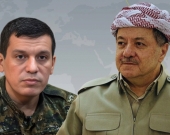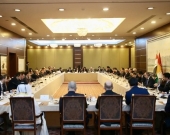Barzani says Iraqi Kurds could strike militants in Syria

“We will not hesitate in directing strikes (against) the terrorist criminals in any place,” Barzani said in an interview with Agence France-Presse (AFP), when asked about the possibility of Kurdish action against militants in Iraq or Syria. “Our duty is to protect the Kurds if we are able,” he said.
Barzani did not name any group but his remarks appeared to be aimed at radical Islamist groups fighting along with the Syrian opposition to topple the Syrian regime. The Iraqi Kurdish leader was speaking after an attack in Arbil, the capital of the autonomous Iraqi Kurdistan, last month, which killed 7 people. An al-Qaeda affiliate, the Islamic State of Iraq and the Levant (ISIL), has claimed responsibility for the attack, the first major one in the Kurdish region since 2007. ISIL said in a statement earlier this month that the attack was in response to a statement made by Barzani expressing readiness to provide support for Kurds battling ISIL and other radical groups in northern Syria.
Barzani said in August that the Kurdistan government was ready to defend Kurds in Syria, but officials later backtracked on his remarks, with his chief of staff saying there were no plans to send troops to Syria.
ISIL, which emerged out of a merger of al-Qaeda’s Iraqi and Syrian affiliates in April, is fighting the Kurds in Syria. The son of the most powerful Syrian Kurdish group, the Democratic Union of Syria (PYD), was killed last week in clashes with ISIL militants near the Turkish border.
The Syrian Kurds and the Kurds in Turkey have accused Ankara of supporting opposition forces, including those linked with al-Qaeda, in their fight against the PYD, a claim Ankara has repeatedly denied. Ankara, a strong supporter of the Syrian opposition fighting to topple President Bashar al-Assad, views PYD dominance of northern Syria with suspicion due to the group’s links with the Kurdistan Workers’ Party (PKK).
Ties between Turkey and Iraqi Kurds were tense in the past due to Ankara’s accusations that they shelter the PKK, which has headquarters in a mountainous area in the Kurdish-run northern Iraq. Relations, however, have improved dramatically in recent years after Turkey and the Kurdistan Regional Government (KRG) agreed to work together to limit the PKK’s influence.
In his interview, Barzani cautioned that military strikes in Syria to protect Kurds did not mean the Kurds wanted to be drawn into the Syrian civil war. “Our opinion is that the Kurds must stand at the same distance” from all parties in the conflict, so “the Kurdish people are not forced into a war” from which they will gain nothing, Barzani said, according to AFP.
More than 200,000 Syrians have fled to Iraq since the start of the conflict more than two years ago. Most of these refugees are Kurds seeking refuge in the Iraqi Kurdish region.
Barzani also said in the interview that Iraqi Kurdistan had provided military training to Syrian Kurds so they could defend their communities. “A number of young (men) were trained, but truly not with the aim of entering the war,” Barzani said.
Barzani’s remarks came at a time when violence, mostly at the hands of al-Qaeda affiliates, is surging across Iraq, reviving old fears of a return to the state of civil war that tore the country apart in 2006-2007.
Source: Todays Zaman












